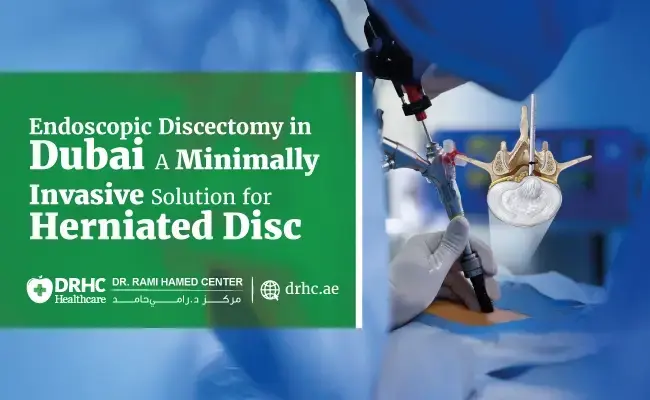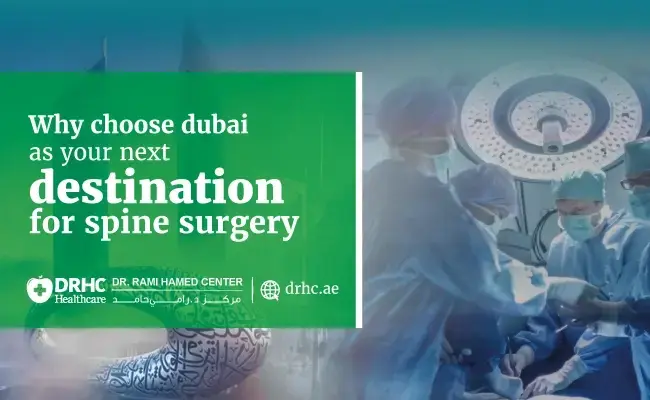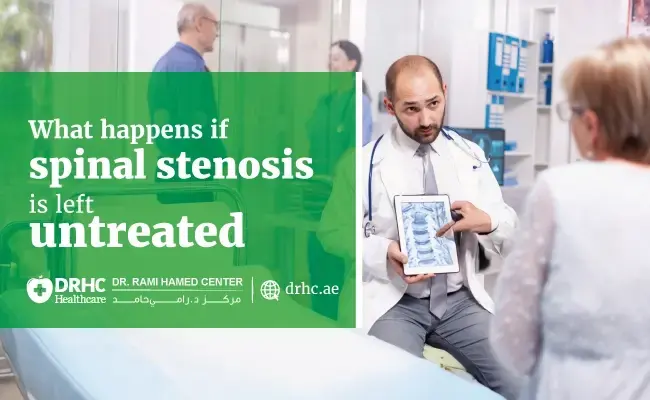
Understanding When It's Time to Seek Advanced Spine Care
A herniated disc, also known as a slipped or ruptured disc, is one of the most common spinal conditions affecting adults—particularly those between the ages of 30 and 50. While physiotherapy is often the first line of treatment, not all herniated disc cases respond to conservative care alone. At DRHC Dubai, we emphasize the importance of recognizing when it's time to go beyond physiotherapy and explore more advanced treatment options.
What Is a Herniated Disc?
The spine is made up of bones (vertebrae) cushioned by discs. These discs act like shock absorbers, allowing flexibility and movement. When a disc becomes damaged—due to age, injury, or strain—it can bulge or rupture, pressing on nearby nerves. This is what we call a herniated disc.
Common Symptoms include:
- Back or neck pain
- Pain radiating into the arms or legs (sciatica)
- Numbness, tingling, or muscle weakness
- Difficulty standing or walking
When Physiotherapy Is Not Enough
Physiotherapy is highly effective in many cases, helping to relieve pain, reduce inflammation, and strengthen supporting muscles. However, there are times when physiotherapy alone is not sufficient, and further intervention is needed.
Signs You May Need More Than Physiotherapy:
- Persistent or worsening pain after several weeks of treatment
- Severe nerve symptoms such as numbness, tingling, or muscle weakness
- Pain interfering with daily activities like walking or sleeping
- Loss of bowel or bladder control (a medical emergency)
- Lack of improvement despite committed physiotherapy sessions
These are red flags that suggest nerve compression or more serious spinal involvement that requires a deeper medical evaluation.
Explore Our Related Blogs
- Is endoscopic discectomy painful?
- What is the recovery time for endoscopic spinal discectomy surgery?
- What is the Success Rate of Endoscopic Discectomy?
- How risky is endoscopic discectomy?
- What should I avoid after a discectomy?
- Why Your Back Pain Keeps Coming Back – And When Surgery Is the Right Step
- Chronic Sciatica: When Injections and Therapy Stop Working
The Role of Diagnosis at DRHC Dubai
Accurate diagnosis is critical to choosing the right treatment path. At Dr. Rami Hamed Center (DRHC) in Dubai, we offer advanced diagnostic tools to fully assess the extent of a herniated disc.
Our diagnostic approach includes:
- MRI and CT scans for detailed imaging of disc herniation
- Neurological exams to assess nerve function
- Nerve conduction studies for patients with severe symptoms
By understanding exactly where the problem lies and how it's affecting your nervous system, we can tailor a treatment plan that goes beyond basic physiotherapy.
Advanced Treatment Options Available
If physiotherapy fails to bring relief, DRHC Dubai offers a full range of advanced treatments, including:
- Medication management (anti-inflammatories, muscle relaxants, nerve pain relievers)
- Epidural steroid injections to reduce inflammation around compressed nerves
- Minimally invasive spine surgery, such as microdiscectomy or endoscopic discectomy
- Spinal decompression procedures and disc replacement, depending on the severity
We take a multidisciplinary approach, involving orthopedic surgeons, neurosurgeons, pain specialists, and physiotherapists to ensure every patient receives comprehensive care.
Take the Next Step Towards Recovery
Living with a herniated disc can be frustrating and limiting—but you don’t have to stay in pain. If you’ve tried physiotherapy and your symptoms persist, it’s time to consult a spine specialist.
At DRHC Dubai, we’re committed to delivering advanced, patient-centered care using the latest technologies and techniques. Early intervention can prevent long-term nerve damage and help you return to a pain-free life.
Book Your Spine Consultation Today
Let our expert spine team at DRHC Dubai help you find the right treatment at the right time.
📞 Call us or 📍 visit our Dubai clinic to schedule your appointment.
Topic: orthopedic Back Pain Spine Surgery




.jpg)




Leave a comment